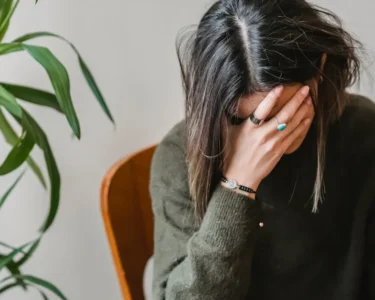Anxiety disorder is a mental health condition characterized by excessive and persistent worry or fear. While it’s normal to feel anxious occasionally, people with anxiety disorders experience intense, prolonged feelings of dread that can interfere with daily activities and even disrupt sleep.
Types of Anxiety Disorders
Anxiety disorders come in various forms, each with its own set of challenges. Understanding the specific type of anxiety disorder can help in managing its impact on sleep.
Generalized Anxiety Disorder (GAD)
GAD is characterized by constant worry about everyday events. People with GAD often feel on edge, making it difficult to relax enough to fall asleep.
Panic Disorder
Panic disorder involves sudden episodes of intense fear, also known as panic attacks. These can occur unexpectedly, leaving the person anxious even during sleep, leading to disturbed nights.
Social Anxiety Disorder
Social anxiety disorder is the fear of social situations where one might be judged or embarrassed. This anxiety can manifest even when lying in bed, making sleep seem impossible.
Common Symptoms of Anxiety
People with anxiety disorders often experience physical symptoms like a rapid heartbeat, restlessness, muscle tension, and difficulty concentrating. These symptoms can make it hard for the body to relax at night, leading to poor sleep quality.
The Importance of Sleep for Mental Health
Sleep plays a crucial role in maintaining mental health. Without enough restorative sleep, the brain cannot function optimally, which can worsen anxiety symptoms, creating a vicious cycle of sleeplessness and heightened anxiety.
How Anxiety Affects Sleep
The Relationship Between Anxiety and Sleep Disorders
Anxiety and sleep disorders, like insomnia, are closely linked. In fact, anxiety is one of the leading causes of sleep disturbances. Let’s dive deeper into how these two issues interact.
Insomnia Triggered by Anxiety
Many people with anxiety find it difficult to fall asleep or stay asleep due to their racing thoughts. Insomnia, which is characterized by the inability to sleep, is commonly reported by those suffering from anxiety disorders.
Sleep Deprivation Exacerbating Anxiety
Lack of sleep doesn’t just result from anxiety; it can also make anxiety worse. When you’re sleep-deprived, your ability to handle stress decreases, which in turn increases anxiety, creating a harmful feedback loop.
The Science Behind Anxiety and Sleep Disruption
Research shows that anxiety stimulates the brain, particularly the hypothalamic-pituitary-adrenal (HPA) axis, which releases stress hormones like cortisol. This stimulation can keep you alert, making it hard to wind down and sleep.
Recognizing Sleep Problems Linked to Anxiety
Signs of Sleep Issues in People with Anxiety
Sleep problems often manifest in specific ways for those dealing with anxiety disorders. Recognizing these signs can be the first step toward finding a solution.
Difficulty Falling Asleep
If you find yourself lying in bed for hours, unable to shut off your thoughts, it could be a sign that anxiety is affecting your ability to fall asleep.
Waking Up Frequently at Night
Many people with anxiety disorders wake up multiple times throughout the night, which can leave them feeling exhausted in the morning.
Nightmares and Restless Sleep
Anxiety can cause vivid, distressing dreams or nightmares, which lead to restless sleep and make it difficult to feel well-rested upon waking.
Strategies to Manage Anxiety for Better Sleep
Cognitive Behavioral Therapy (CBT)
One of the most effective treatments for anxiety-related sleep problems is Cognitive Behavioral Therapy (CBT).
What is CBT and How It Works
CBT helps by identifying and changing negative thought patterns that contribute to anxiety and sleep issues. It’s a structured, short-term therapy that equips individuals with tools to manage their anxiety and improve sleep.
Relaxation Techniques
Learning to relax before bed can significantly improve sleep for those struggling with anxiety.
Breathing Exercises
Deep breathing exercises help calm the mind and body, reducing anxiety and preparing you for sleep.
Progressive Muscle Relaxation
This technique involves tensing and then relaxing each muscle group in the body, which helps release physical tension caused by anxiety.
Sleep Hygiene Tips for Anxiety
Improving your sleep environment and habits—also known as sleep hygiene—can have a major impact on your ability to sleep when anxious.
Creating a Relaxing Bedtime Routine
A calming bedtime routine can signal to your brain that it’s time to sleep. This might include activities like reading, taking a warm bath, or practicing meditation.
Limiting Caffeine and Alcohol Intake
Both caffeine and alcohol can interfere with sleep, especially if consumed too close to bedtime. Limiting these can improve your sleep quality.
Maintaining a Regular Sleep Schedule
Going to bed and waking up at the same time each day helps regulate your body’s internal clock, making it easier to fall asleep and stay asleep.
Lifestyle Changes to Improve Sleep and Reduce Anxiety
Physical Activity and Its Role in Reducing Anxiety
Exercise releases endorphins, which help reduce anxiety. Engaging in regular physical activity, especially earlier in the day, can promote better sleep at night.
Mindfulness and Meditation Practices
Mindfulness and meditation have been shown to reduce anxiety levels and improve sleep quality. These practices focus on staying present and calming the mind, making it easier to sleep.
Limiting Screen Time Before Bed
Exposure to screens, especially in the hour before bed, can disrupt your body’s production of melatonin, a hormone that regulates sleep. Reducing screen time can help you wind down.
When to Seek Professional Help
Recognizing the Need for Therapy or Medication
If anxiety is severely affecting your sleep and daily life, it might be time to seek professional help. A mental health professional can offer therapies like CBT or prescribe medications to manage your anxiety.
How a Sleep Specialist Can Help
A sleep specialist can help identify any underlying sleep disorders that might be contributing to your sleep problems. They can recommend tailored treatments to improve both your sleep and your anxiety.
Conclusion: Finding Balance Between Sleep and Anxiety
Managing anxiety and improving sleep often go hand in hand. By recognizing the signs of anxiety-related sleep problems and adopting strategies to address both, you can break the cycle of anxiety and insomnia. With the right treatment and lifestyle changes, it’s possible to enjoy restful nights and better mental health.
FAQs:
Can anxiety really cause insomnia?
Yes, anxiety is one of the leading causes of insomnia. The racing thoughts and heightened stress levels make it difficult to relax and fall asleep.
How can I tell if my sleep problems are caused by anxiety?
If you experience constant worry, have difficulty shutting your mind off at night, and frequently wake up feeling restless, your sleep issues may be linked to anxiety.
What is the best relaxation technique to calm anxiety before bed?
Breathing exercises and progressive muscle relaxation are both highly effective techniques to reduce anxiety and prepare the body for sleep.
Can exercise really help with anxiety-related sleep problems?
Absolutely! Regular physical activity reduces anxiety levels, making it easier to fall asleep and stay asleep through the night.
When should I see a doctor about anxiety and sleep issues?
If your anxiety and sleep issues persist for weeks or interfere with your daily life, it’s a good idea to consult a doctor or mental health professional.



